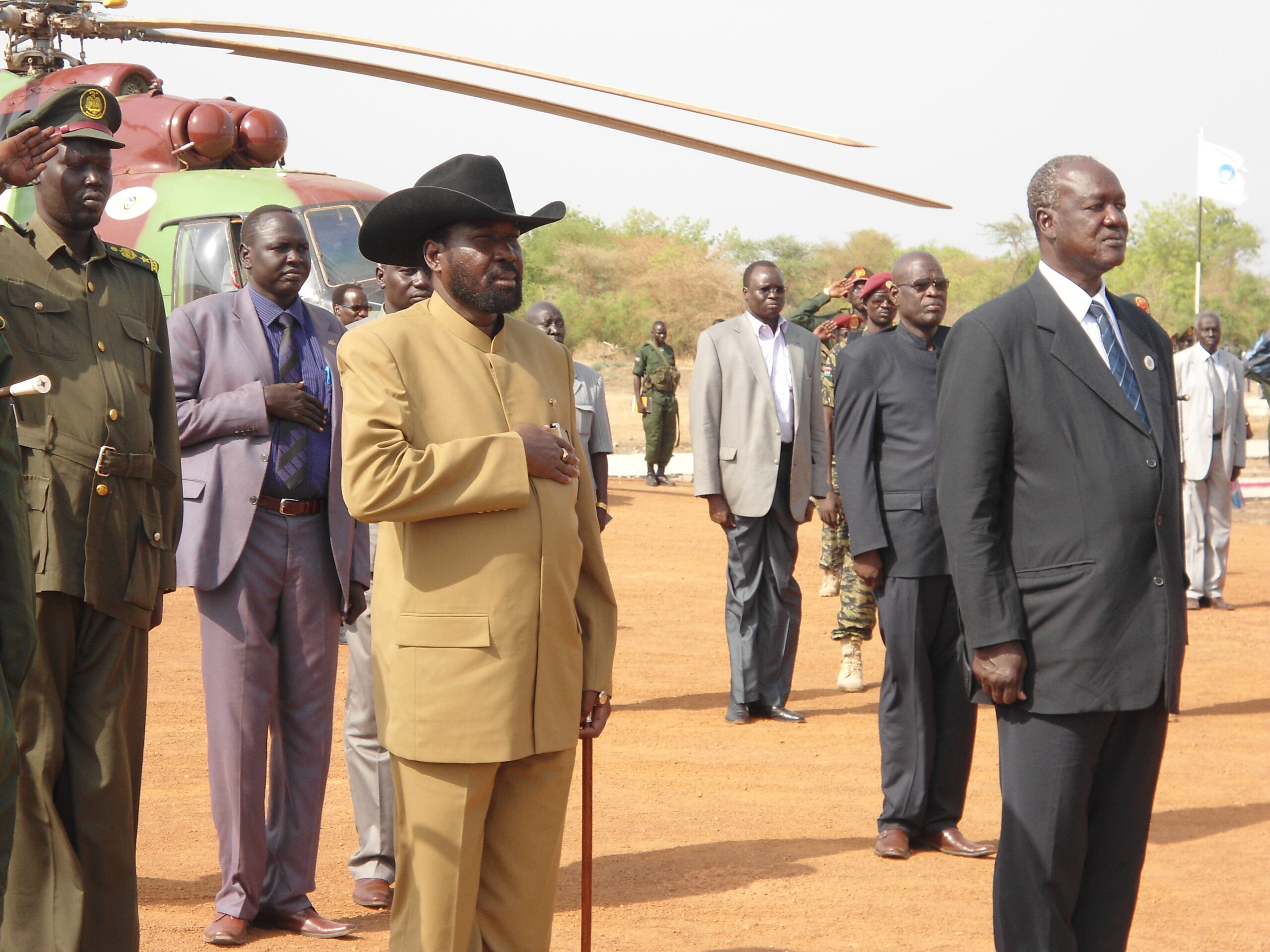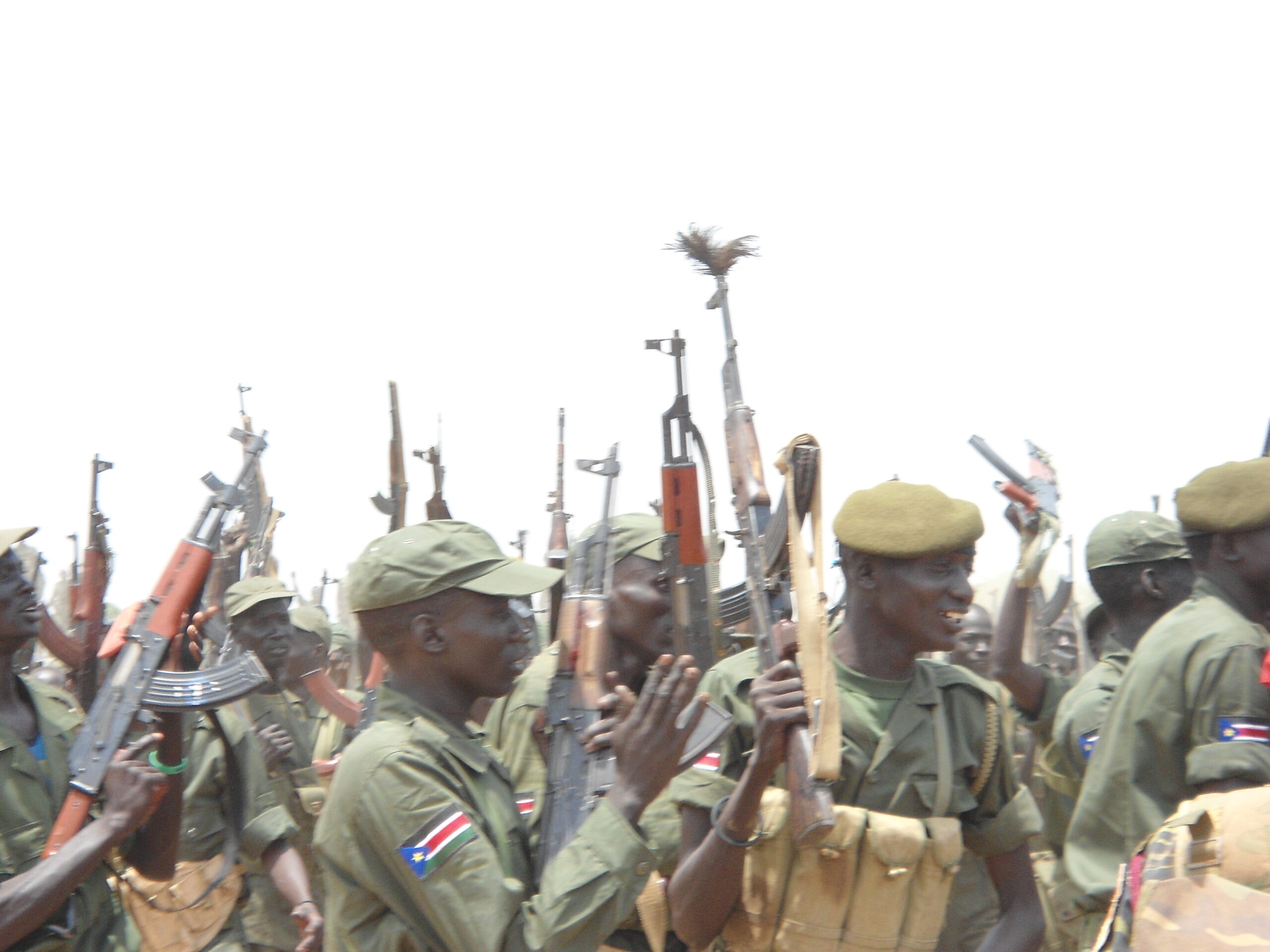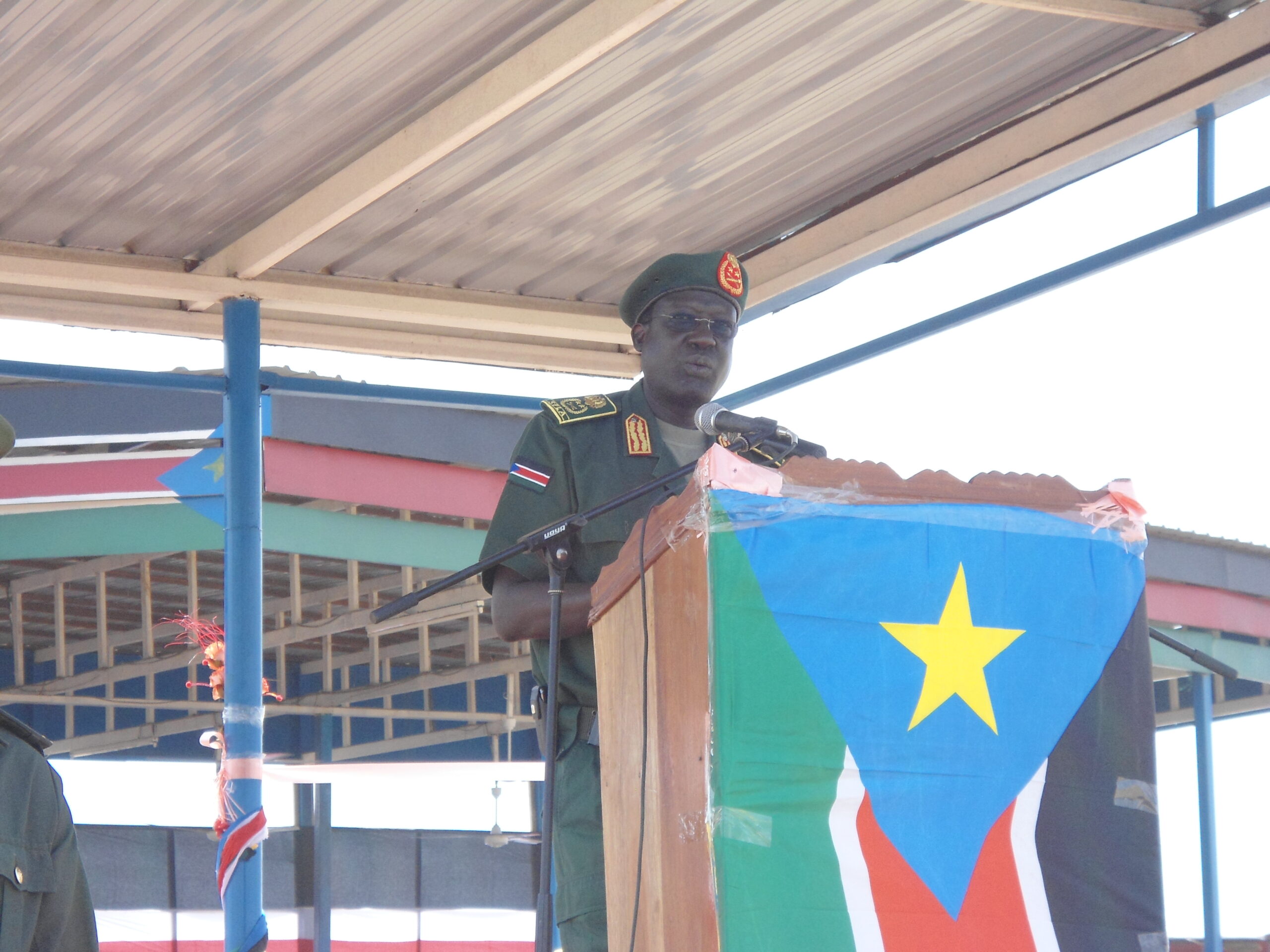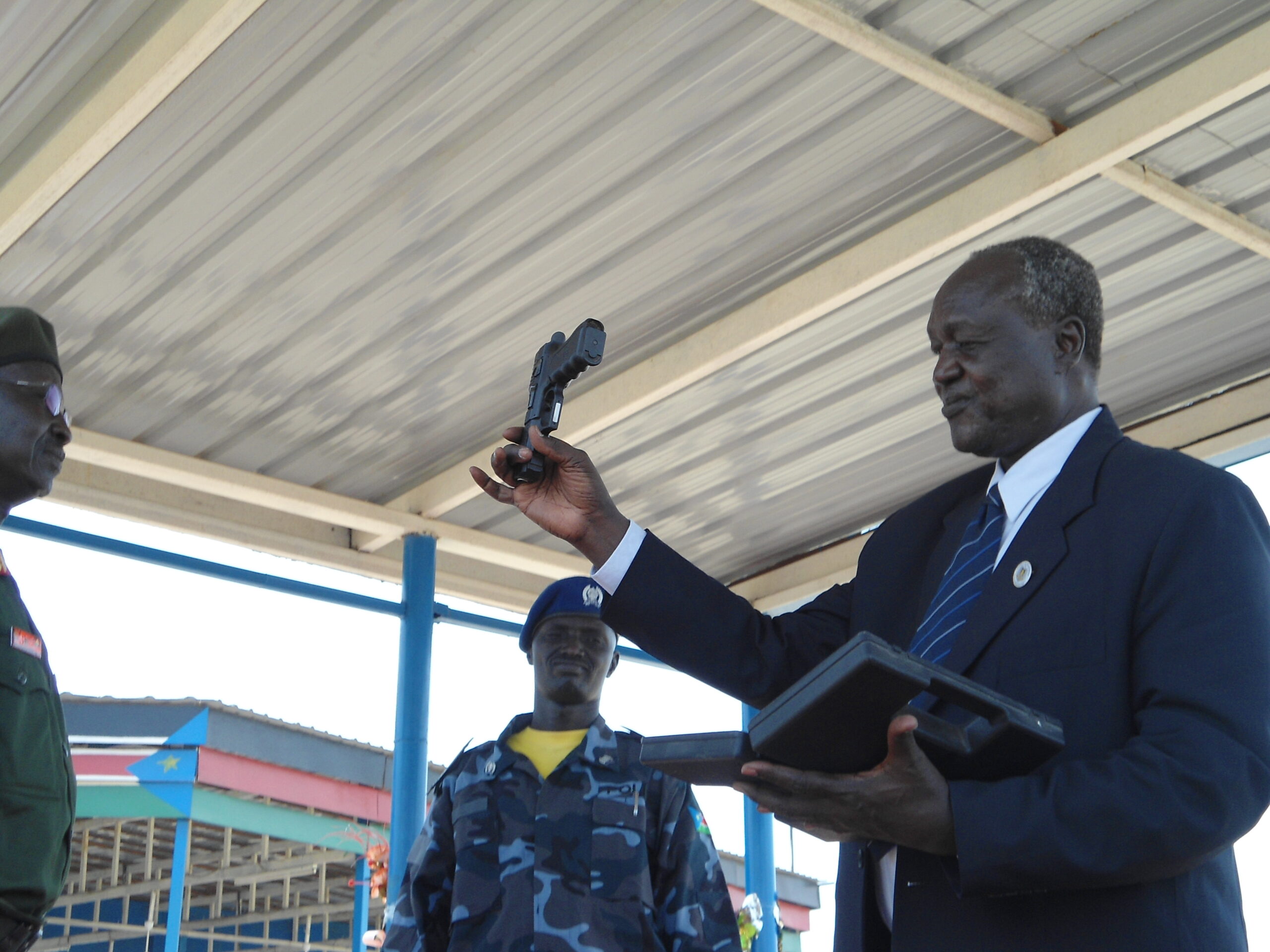President Kiir opens disarmament in troubled Jonglei
By John Actually
March 12, 2012 (BOR) – The President of South Sudan, Salva Kiir Mayardit, travelled to Bor on Monday to declare the start of a disarmament campaign in Jonglei, asking the state’s population to corporate with the country’s military.

The president warned SPLA forces responsible for the disarmament campaign to avoid tribalism, urging them to work as one tribe serving one nation. South Sudan became independent in July last year as part of a peace deal with north Sudan ending decades of civil war that has left the region awash with small arms.
Conflict in Jonglei between the Murle and Luo Nuer ethnic groups has attracted international attention and questions over whether the young country can function as a viable state.
Over 1,000 people died in cattle raids and revenge attacks in 2011, which escalated in December when 6,000 armed Luo Nuer men attacked Pibor County, the home of the Murle tribe.
TRIBALLY NEUTRAL?
There are fears that this disarmament campaign, like previous efforts, may not succeed as some ethnic groups may be more thoroughly disarmed than others leaving communities vulnerable to further attacks.

“If you are Nuer, Anuak, Dinka or Nuer, don’t tell your people to bury guns, instead you tell them to hand them over. If your food finishes, you ask the people in the village you are in to give you oxen or bulls as food till they surrender all their guns to you but don’t take by force,” he added.
Kiir urged government ministers, MPs and civilians to corporate by immediately giving their guns to the 15,000 SPLA soldiers that have been deployed across the state to conduct the exercise.
The army has been criticised for not preventing clashes between ethnic groups in Jonglei in recent months not only in the Luo Nuer offensive on Pibor, which affected over 120,000 people according to the UN, but also over the weekend when an estimated 3,000 Murle attacked Akobo County.
On Monday Jonglei State governor, Kuol Manyang Juuk, accused the Murle of carrying out the Friday attack on Akobo’s Nuer community, leaving hundreds missing and feared dead, 200 others wounded and over 10,000 families displaced and tens of thousands of cattle looted. The figures from the incident have not been independently verified.
The Murle were also accused of attacking Twic East County on 10 March. Manyang said that such attacks provoked the security situation and increased the chances of counter attacks.
SPLA DEFENDS DISARMAMENT PROGRAMME
The SPLA’s Chief of General Staff, Gen. James Hoth Mai, said the national army won’t “let the people die every day and watch on”, apparently in response to fears raised by the United States and United Nations that the process may not pass off peacefully.

He said that the 15,000 troops deployed to disarm civilians in Jonglei state will stay until there are no guns in the hands of civilians and questioned critics of disarmament.
“Which one is better? To let our people die?” Hoth said.
The United States Ambassador to South Sudan, Susan Page, said last week in Bor that the US supports voluntary disarmament. The United Nations Mission in South Sudan (UNMISS) has also express concerns that the exercise may not be peaceful as raiders may not easily part with their guns.
South Sudan’s minister for defence, Gen. John Kong Nyuon, who accompanied Kiir at the launch ceremony in Bor dismissed as “nonsense” claims that disarmament of civilians by the army (SPLA) in Jonglei state may turn violent.
“Those who are saying disarmament will be bloody are the same people who blame us [government] for not providing security,” Gen. Kong said.
“They contradict themselves by saying that the disarmament will be bloody. That is nonsense. We are not going to kill civilians. We want peace and there is no way [to] restore peace unless we take guns,” Gen. Kong stressed.
The South Sudanese Inspector General of Police (IGP), Gen. Tito Acuil, told the army and police forces in Bor Monday to retrieve guns with discipline.
“Don’t kill civilians but take the guns. The UN is already complaining [that it] will turn violent,” Acuil said.
GOVERNOR HANDS OVER HIS GUNS
At the ceremony governor Manyang handed over his own guns – a pistol and AK47 – to the head of the disarmament operation, General Kuol Dim, as an example to state government officials.

“If I can give my gun, who else wants to refuse giving his guns,” Governor Kuol said.
Code-named as “Operation Restore Peace in Jonglei” state, the exercise “will be voluntary but those who will try to resist or challenge the authority will be met with strong arm of the law,” Malak Ayuen, the head of South Sudan’s army information department, told reporters in Bor on Saturday.
Ayuen said that Lt. Gen. Kuol Deng Kuol will head the operation. He will be deputised by Maj. Gen. Peter Gadet, who rejoined the SPLA having formed a rebel group the South Sudan Liberation Movement/Army (SSLM/A) in April 2011 vowing to overthrow the Juba government.
THE RETURN OF GADET
However, in August 2011 he abandoned his rebellion and rejoined the SPLA but failed to take the whole of the SSLM with him. In September he agreed that the soldiers still loyal to him would be moved from Mayom County in Unity state, where the group was based, to Mapul county of Lakes state in order to be integrated back into the SPLA.
The SSLM is mainly constituted of men from Gadet’s Nuer tribe and was accused by Juba of receiving backing from Khartoum in an effort to destabilise South Sudan’s oil-rich Unity state. North Sudan denies backing South Sudanese rebels, including Gadet whose allegiances have changed many times since the SPLA – then a rebel group itself – began fighting Khartoum in 1983.
Since 2005 the SPLA has been the official army of South Sudan, and its political wing – the SPLM – the ruling party in Juba.
Despite voting for independence last year South Sudan is still trying to reconcile the tribal divisions that emerged during the civil war. Perhaps none more so in Jonglei, the scene of some of the worst fighting between southern groups during the civil war.
The amount of small arms in Jonglei is largely a consequence of the two-decade conflict, which ended in 2005. Many communities in South Sudan fear that disarming will leave them vulnerable to attack by other groups.
A similar disarmament process in 2006 turned violent in the Lou Nuer counties of Akobo, Uror and Nyirol and was stopped before continuing to Murle territory in Pibor county. The Lou Nuer said this forced them to rearm.
Aware of these concerns, the SPLA have been keen to emphasise the latest campaign will be neutral and occur across the state, which is roughly the same size as Bangladesh and has very poor infrastructure.
“We want to inform our people that the disarmament is not targeting any [particular] tribe or tribes,” Ayuen, the head of South Sudan’s army information department, said on Saturday.
“It [disarmament] is targeting those who are armed and .. they are using to arms for cattle raiding. We want it to be voluntary, peaceful but I am sure those who want to resist or challenge the authority will be met with strong arm of the law,” Malak added.
A long convoy of military vehicles and hardware marched through Bor, the capital of Jonglei state on Monday morning as authorities called on the public to gather at the New Jonglei State Stadium to receive President Salva Kiir.
Sudan Tribune witnessed 40 pick-up trucks with either mounted artillery or full of soldiers chanting military songs. Over 20 military tanks and 50 big trucks moved through Bor town ahead of the president’s arrival.
President Kiir’s return to Bor comes only 17 days after visited the state capital on February 25 when the Transitional Constitution was signed into law by Governor Kuol Manyang.
(ST)
